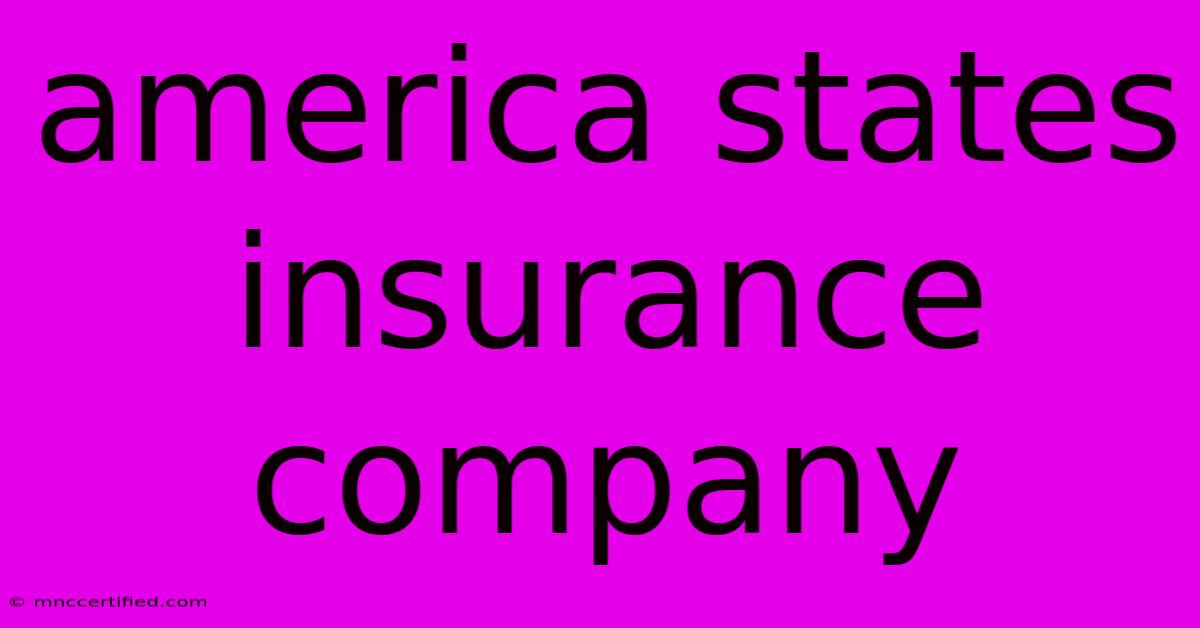America States Insurance Company

Table of Contents
America's States Insurance Companies: A Comprehensive Guide
Finding the right insurance can be a daunting task. With so many companies vying for your business, understanding the nuances of each is crucial. This comprehensive guide delves into the world of state-based insurance companies in America, exploring their benefits, drawbacks, and how to choose the best fit for your needs.
Understanding State-Based Insurance Companies
Unlike national insurance companies with nationwide reach, state-based insurers primarily operate within a specific state or region. This localized focus often translates to:
- Stronger community ties: These companies frequently invest heavily in their local communities, supporting local initiatives and charities.
- Personalized service: Smaller size often means more personalized customer service and quicker response times to claims.
- Potential for lower premiums (in some cases): By focusing on a smaller geographic area, these companies can sometimes offer more competitive premiums, although this isn't always the case.
Key Considerations When Choosing a State-Based Insurance Company
While local insurers offer advantages, it's vital to consider these factors before committing:
- Financial stability: Check the insurer's financial ratings from agencies like AM Best, Moody's, and Standard & Poor's. A strong rating indicates financial stability and the ability to pay claims. Don't overlook this crucial step!
- Coverage options: Compare the types of coverage offered – auto, home, life, health – ensuring they meet your specific needs. Some smaller companies may offer a more limited range of products.
- Customer service reputation: Read online reviews and check independent rating sites to gauge the customer service experience. Are customers generally satisfied with claim handling and communication?
- Geographic limitations: Remember the primary operational area. If you travel frequently or plan to relocate, a national provider might be a more suitable choice.
Finding the Right State-Based Insurer for You
The best approach involves a multi-pronged strategy:
- Identify your needs: Determine the types of insurance you require (auto, home, life, etc.) and the level of coverage you need.
- Compare quotes: Get quotes from multiple state-based insurers in your area. Online comparison tools can streamline this process, but always verify information directly with the insurer.
- Read reviews: Examine customer reviews on sites like Yelp, Google Reviews, and the Better Business Bureau. Look for patterns in positive and negative feedback.
- Check financial ratings: As mentioned earlier, financial strength is paramount. Ensure the insurer has a solid rating from reputable agencies.
- Ask questions: Don't hesitate to contact insurers directly with questions about coverage, policies, and claims procedures. A responsive and helpful customer service team is a good sign.
The Benefits of Supporting Local Insurance Companies
Choosing a state-based insurer isn't just about finding a good deal; it's about supporting local businesses and strengthening your community. Your premiums contribute to the local economy, potentially creating jobs and boosting local initiatives. This community investment should be considered a significant benefit.
Potential Drawbacks: Weighing the Pros and Cons
While local insurers often provide great service, they also have potential drawbacks:
- Limited reach: Coverage may not extend beyond the state or region they operate in.
- Fewer options: They might offer fewer product choices compared to national companies.
- Potential for higher premiums (in some cases): While sometimes offering lower rates, they might also have higher premiums depending on your specific needs and location.
Conclusion: Making an Informed Decision
Selecting the right insurance provider requires careful consideration. By understanding the benefits and drawbacks of state-based insurance companies and conducting thorough research, you can make an informed decision that best protects your assets and future. Remember, the best insurance company isn't a one-size-fits-all solution. Your individual needs and circumstances should guide your choice. Prioritize financial stability, coverage options, customer service, and your community's well-being to find the perfect fit.

Thank you for visiting our website wich cover about America States Insurance Company. We hope the information provided has been useful to you. Feel free to contact us if you have any questions or need further assistance. See you next time and dont miss to bookmark.
Featured Posts
-
Charity Scandal Captain Toms Ex Boss Reacts
Nov 22, 2024
-
Police Scotland Issues Storm Bert Travel Update
Nov 22, 2024
-
Reverend Richard Coles Age Career Husband
Nov 22, 2024
-
I M A Celebs Coles Admits Past Lie
Nov 22, 2024
-
Juventus Vs Arsenal Womens Champions League
Nov 22, 2024